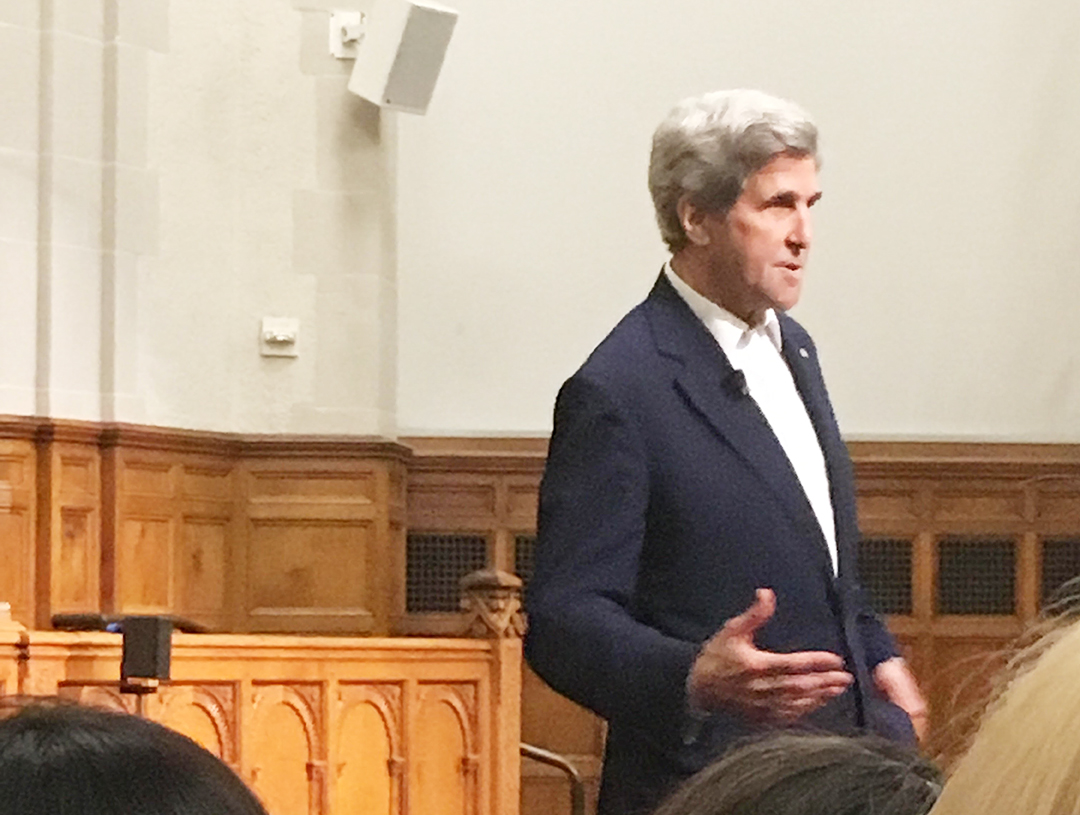
At the inaugural “Kerry Conversation” on Thursday afternoon, former Secretary of State John Kerry ’66 spoke broadly about current issues in international relations, including his work with Russia in Syria.
More than 500 people attended the event, which was held in Yale Law School’s Levinson Auditorium as part of the Kerry Initiative. The initiative, an interdisciplinary global affairs program, was announced by the Jackson Institute for Global Affairs in February. In addition to hosting Kerry Conversations, Kerry will also teach a seminar, conduct research and hold an annual conference.
“I can’t think of a time in the history of our country where it has been as complex [as today], where the world was changing dramatically at [such] a pace,” he said.
In his opening remarks, James Levinsohn, director of the Jackson Institute, said future conversations will be between Kerry and guest speakers hand-picked by the former secretary of state. On Thursday, however, Levinsohn and attending students were free to ask Kerry questions on various topics of interest.
Discussing the Obama administration’s work in Syria and negotiations with Russians, Kerry said he believed the United States had the best opportunity to change the situation in Syria in 2012 when it had the most leverage over Syrian President Bashar al-Assad. He said the only way to achieve peace in Syria is with negotiations, not military action.
He added that people often do not recognize the many parties involved with the Syrian conflict: the United States, Russia, Turkey, Iran, terrorist groups and Sunni and Shia groups, among others. Kerry said the multitude of involved parties is the reason that a military solution will not work for the region.
He added that while he believed that Russia continuously violated a multitude of norms and international laws during the Syrian conflict, the country was still helpful in many recent U.S. deals, including the Iran nuclear deal.
“You’ve got to keep the interests of our nation on that table … and try to find a way to get their interests on the table,” he said. “We can find a way to do things by just being reasonable in conversation.”
Speaking about the Iran nuclear deal, Kerry underscored that while he realized Iran may not hold up its end of the deal after the 15-year mark, making the deal was still the right move for America. He said the United States is tracking Iran’s activities daily and will continue to do so for years to come.
“Aren’t we better off doing something for 15 years and letting the world see that we are trying to negotiate and have a reasonable approach to nuclear power?” he asked. “I know what I think the answer to that is.”
Kerry spoke about the necessity to keep Europe from falling apart, saying that the United States needs the European Union to continue standing up for free speech and civil liberties worldwide. He also spoke about climate change and said the solution is not about an undiscovered technology, but about legislation.
“It’s there,” he said. “It’s called energy policy, and we have sustainable energy capacity.”
He added that while industry lobbying in Congress is a problem, he remains optimistic about the future of energy policy around the world.
Kerry ended the event on a positive note, saying that while there are lots of problems in the world today, there were plenty of upsides too. The first generation of African children are currently being born free of AIDS; the world has good nuclear weaponry standards; and the extreme poverty levels are only 10 percent — the lowest in human history, he said. Kerry added that technological advancements are allowing people to be more aware of the world around them and effect bigger political change.
“I’m optimistic,” Kerry told the audience. “I’m optimistic because of you.”
Asked about political discourse on campus, Kerry underscored the need for open dialogue, calling it the “hallmark of [American] democracy.” He said Americans need to work on restoring the communication process in the world of “alternative facts.”
Former Yale College Council President Joseph English ’17, who attended the event, said Kerry was a charismatic speaker and added that he was excited to have him come to teach at the Jackson Institute.
“He seems very open-minded and optimistic, which I think is going to add a lot of excitement and … optimism to the Jackson Institute,” English said.
Aastha KC ’20, another attendee, said she found Kerry’s thoughts on climate change interesting and enjoyed listening to him talk about how people could combat current problems in the world. She said she was looking forward to attending more Kerry Conversations next year.
The conversation was initially scheduled for April 6, but was postponed until Thursday because severe weather conditions had prevented Kerry from traveling that day.







